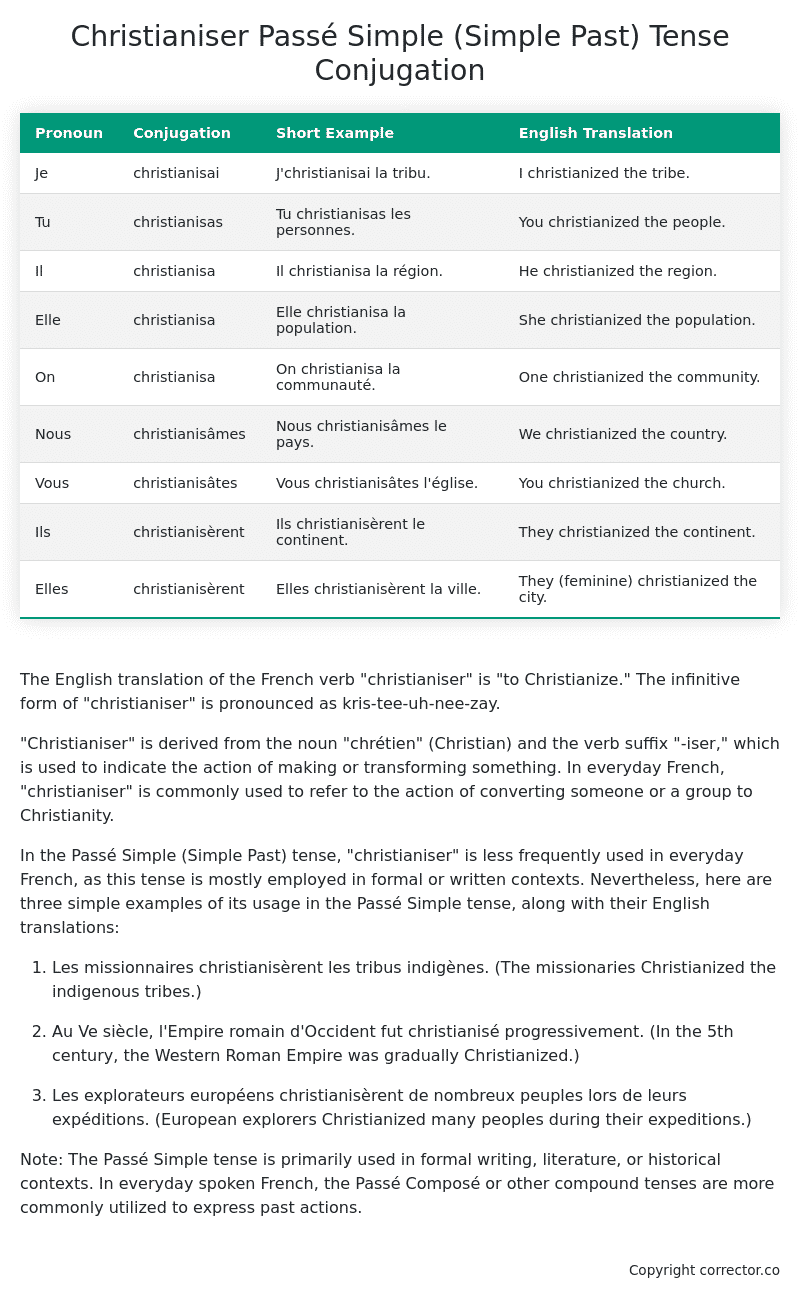Passé Simple (Simple Past) Tense Conjugation of the French Verb christianiser
Introduction to the verb christianiser
The English translation of the French verb “christianiser” is “to Christianize.” The infinitive form of “christianiser” is pronounced as kris-tee-uh-nee-zay.
“Christianiser” is derived from the noun “chrétien” (Christian) and the verb suffix “-iser,” which is used to indicate the action of making or transforming something. In everyday French, “christianiser” is commonly used to refer to the action of converting someone or a group to Christianity.
In the Passé Simple (Simple Past) tense, “christianiser” is less frequently used in everyday French, as this tense is mostly employed in formal or written contexts. Nevertheless, here are three simple examples of its usage in the Passé Simple tense, along with their English translations:
-
Les missionnaires christianisèrent les tribus indigènes.
(The missionaries Christianized the indigenous tribes.) -
Au Ve siècle, l’Empire romain d’Occident fut christianisé progressivement.
(In the 5th century, the Western Roman Empire was gradually Christianized.) -
Les explorateurs européens christianisèrent de nombreux peuples lors de leurs expéditions.
(European explorers Christianized many peoples during their expeditions.)
Note: The Passé Simple tense is primarily used in formal writing, literature, or historical contexts. In everyday spoken French, the Passé Composé or other compound tenses are more commonly utilized to express past actions.
Table of the Passé Simple (Simple Past) Tense Conjugation of christianiser
| Pronoun | Conjugation | Short Example | English Translation |
|---|---|---|---|
| Je | christianisai | J’christianisai la tribu. | I christianized the tribe. |
| Tu | christianisas | Tu christianisas les personnes. | You christianized the people. |
| Il | christianisa | Il christianisa la région. | He christianized the region. |
| Elle | christianisa | Elle christianisa la population. | She christianized the population. |
| On | christianisa | On christianisa la communauté. | One christianized the community. |
| Nous | christianisâmes | Nous christianisâmes le pays. | We christianized the country. |
| Vous | christianisâtes | Vous christianisâtes l’église. | You christianized the church. |
| Ils | christianisèrent | Ils christianisèrent le continent. | They christianized the continent. |
| Elles | christianisèrent | Elles christianisèrent la ville. | They (feminine) christianized the city. |
Other Conjugations for Christianiser.
Le Present (Present Tense) Conjugation of the French Verb christianiser
Imparfait (Imperfect) Tense Conjugation of the French Verb christianiser
Passé Simple (Simple Past) Tense Conjugation of the French Verb christianiser (You’re reading it right now!)
Passé Composé (Present Perfect) Tense Conjugation of the French Verb christianiser
Futur Simple (Simple Future) Tense Conjugation of the French Verb christianiser
Futur Proche (Near Future) Tense Conjugation of the French Verb christianiser
Plus-que-parfait (Pluperfect) Tense Conjugation of the French Verb christianiser
Passé Antérieur (Past Anterior) Tense Conjugation of the French Verb christianiser
Futur Antérieur (Future Anterior) Tense Conjugation of the French Verb christianiser
Subjonctif Présent (Subjunctive Present) Tense Conjugation of the French Verb christianiser
Subjonctif Passé (Subjunctive Past) Tense Conjugation of the French Verb christianiser
Subjonctif Imparfait (Subjunctive Imperfect) Tense Conjugation of the French Verb christianiser
Conditionnel Présent (Conditional Present) Tense Conjugation of the French Verb christianiser
Conditionnel Passé (Conditional Past) Tense Conjugation of the French Verb christianiser
Conditionnel Passé II (Conditional Past II) Tense Conjugation of the French Verb christianiser
L’impératif Présent (Imperative Present) Tense Conjugation of the French Verb christianiser
L’impératif Passé (Imperative Past) Tense Conjugation of the French Verb christianiser
L’infinitif Présent (Infinitive Present) Tense Conjugation of the French Verb christianiser
L’infinitif Passé (Infinitive Past) Tense Conjugation of the French Verb christianiser
Le Participe Présent (Present Participle) Tense Conjugation of the French Verb christianiser
Le Participe Passé (Past Participle) Tense Conjugation of the French Verb christianiser
Struggling with French verbs or the language in general? Why not use our free French Grammar Checker – no registration required!
Get a FREE Download Study Sheet of this Conjugation 🔥
Simply right click the image below, click “save image” and get your free reference for the christianiser Passé Simple tense conjugation!

Christianiser – About the French Passé Simple (Simple Past) Tense
Formation
Usage
Narration
Historical Context
Interactions with other tenses
Passé Composé
Imparfait
Conditional and Subjunctive
Summary
I hope you enjoyed this article on the verb christianiser. Still in a learning mood? Check out another TOTALLY random French verb conjugation!


